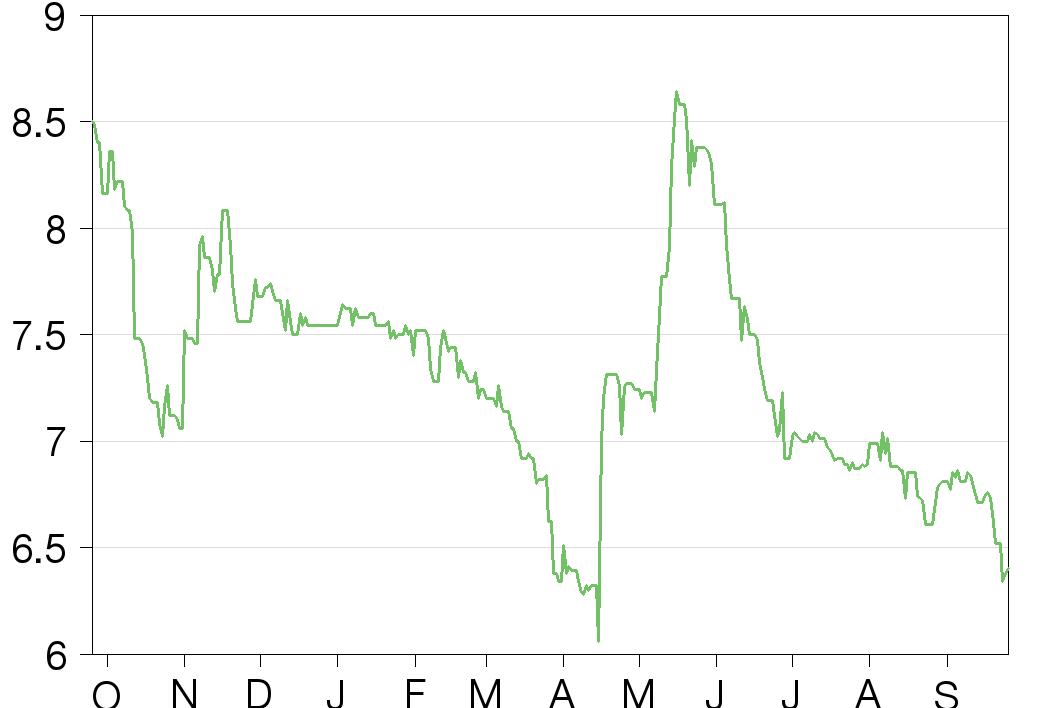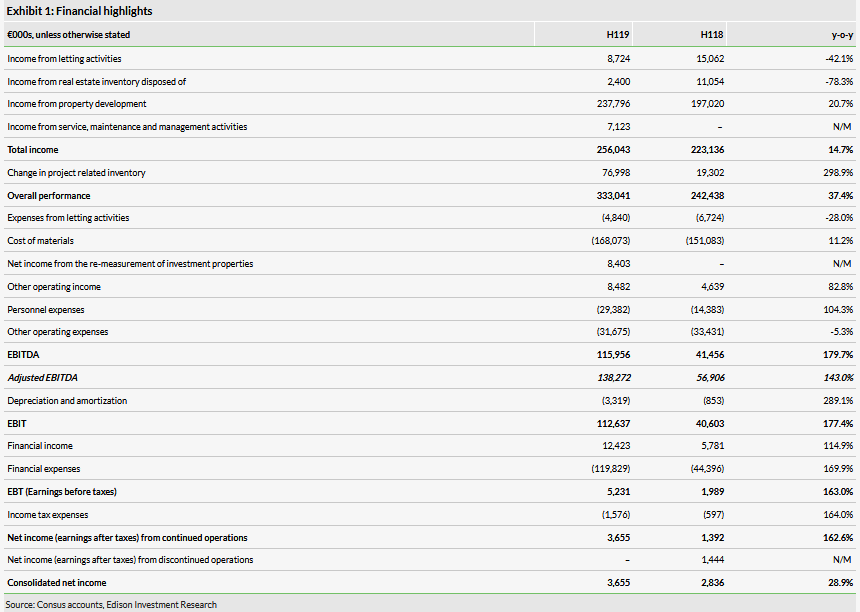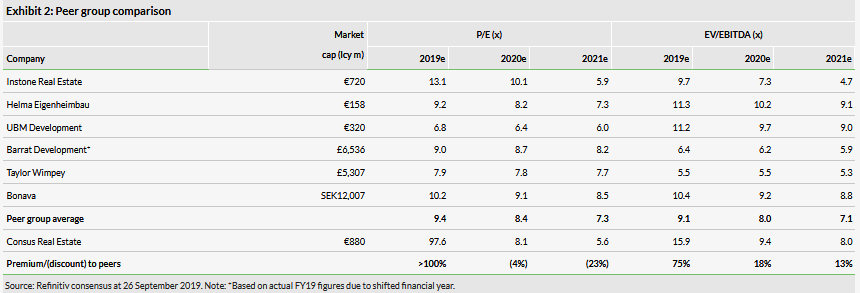Consus Real Estate has further expanded its project portfolio with four acquisitions of development projects with c €1.2bn of gross development value (GDV) signed so far this year. As a result, it currently holds 68 projects in its portfolio with GDV exceeding €10bn. Importantly, 25 projects have already been forward sold and thus contributed to Consus’s earnings in H119. Together with nine projects under forward sale negotiations, they account for c 28% of portfolio GDV. The recently introduced rental cap in Berlin (12% of Consus’s portfolio) had no adverse impact on Consus’s operations, as newbuild apartments are exempt from the regulation.
Financials: SSN contributes to income growth
In H119, Consus reported a total income increase of 14.7% y-o-y to €256m, driven by the consolidation of SSN Group (renamed Consus Swiss Finance), which contributed €69.3m. Overall performance (ie including a change in project-related inventory) was up 37.4% y-o-y to €333m in H119. EBITDA, adjusted for purchase price allocation (PPA) and one-offs, reached €138.3m vs €56.9m in H118, with margin improving to 53.9% from 25.5%. As financial expense was up to €119.8m in H119 from €44.4m last year on the back of new loans (financing project acquisitions), SSN group consolidation and the senior secured bond issue, net income reached a modest €3.7m (but was up c 29% y-o-y). Consus confirmed its target of €450m adjusted EBITDA in 2020.
Implementing measures to reduce cost of debt
In May 2019, Consus successfully issued a €400m senior secured bond, using the net proceeds to refinance €250m of the SSN acquisition facility and expensive junior debt. At the project level, Consus targets significant reduction in mezzanine debt, which should be cut by half in FY19 from the current €500m, and then further reduced to a negligible level by end Q120. As at end June 2019, net debt stood at €2.5bn (76% of the market value of gross assets), but due to the disposal in Leipzig concluded after the balance sheet date it has since reduced to €2.3bn.
Valuation: Trading at diminishing premium
Consus is trading at a significant premium to peers on FY19e P/E, which turns into a discount in the following years, suggesting higher bottom-line growth vs peers. Based on pro forma last 12-month (LTM) adjusted net income at end June 2019, Consus is trading at a 20% premium to peers. The EV/EBITDA multiple indicates a premium to peers (albeit gradually diminishing over time).
Consensus estimates

Share price graph

Business description
Consus Real Estate, based in Berlin, is the leading listed residential real estate developer in the nine largest cities in Germany. Following acquisition of SSN Group, the company's portfolio consists of 68 projects with a gross development value of €10bn.
Financials: More projects generating earnings
In H119, Consus reported a c 14.7% y-o-y increase in total income, which reached €256.0m, and a c 37.4% upsurge in overall performance amounting to €333.0m. However, it is worth noting that the y-o-y comparability of the company’s financial figures is limited due to its M&A activity over the last 12 months. In August 2018, Consus sold the commercial real estate buy-and-hold business GxP German Properties (acquired in November 2017) and acquired SSN Group in November 2018 to solidify its position as a pure-play property developer. The changes in the group have been clearly reflected in the revenue structure, as income from letting activities and disposals of real estate decreased by 42.1% y-o-y to €8.7m and 78.3% y-o-y to €2.4m respectively. Meanwhile, income from property development reached €237.8m following a 20.7% y-o-y increase, while the change in project-related inventory (which reflects capitalised expenditures on development projects incurred before their sale) jumped from €19.3m to €77.0m.
At present, Consus holds 25 projects contributing to revenues from property development (out of a total of 68 currently in its portfolio). Of these, 19 are subject to forward sale to institutional purchasers (representing over 80% of the total income from property development), with the remaining six being attributable to retail condo sales. M&A activity has also affected the company’s expenditure, with personnel expenses more than doubling y-o-y and reaching €29.4m due to the SSN Group acquisition, new loans (financing project acquisitions) and the senior secured bond issue. Similarly, financial expenses rose to €119.8m in H119 from €44.4m last year on the back of increased interest expense from loans following SSN consolidation.

As Consus started to fully consolidate SSN and is gradually moving projects to the earnings-generating phase, it reported an EBITDA increase to €116.0m in H119 from €41.5m in H118, with the EBITDA margin improving to 45% from 19% in H118. However, this included €22.3m of PPA and one-off events in H119. Adjusting for this, EBITDA reached €138.3m in H119 vs €56.9m in H118, with the margin improving to 53.9% from 25.5%.
Assuming SSN consolidation throughout the whole period (rather than from November 2018), the company’s pro forma last 12-month (LTM) adjusted EBITDA would be €303m as at H119 compared to €253m in FY18 (also on a pro forma basis). These calculations can be further extended to account for results from the upfront sale of the ‘416’ project in Leipzig (concluded in July 2019, ie after the reporting date), which would put the pro forma LTM adjusted EBITDA at €408m, representing a 61% like-for-like increase vs FY18. Consus also provided a pro forma LTM adjusted net income figure, which stood at €78m compared to €3.7m consolidated income reported in the financial statement for H119. Consus reiterated its target at €450m adjusted EBITDA in 2020, which was increased from €300m following the SSN acquisition. Moreover, the management confirmed its targeted medium-term net debt to adjusted EBITDA ratio of c 3x. Currently, the net debt to pro forma LTM adjusted EBITDA ratio sits at 8.3x and has remained broadly stable compared to FY18.
Next stage of portfolio development
Consus’s portfolio has increased ytd to €10bn GDV from €9.6bn at end-December 2018, with all growth attributable to CG Gruppe, as SSN Group holdings remained stable at €3.5bn. New investments include three acquisitions representing a GDV of €932m signed in H119 and a further one adding €275m GDV signed after the balance sheet date. Taking into account the upfront sale of the Leipzig property (successfully closed in July), the current number of projects held stands at 68.
Along with the growing portfolio, Consus was able to expand its forward sale activity, with the value of projects already sold or under letter of intent (LOI) up to €2.8bn at end-June 2019 (28% of portfolio GDV), compared to €2.5bn as at end-2018 (26% of GDV). In the reporting period, one significant forward sale was concluded, related to the Königshöfe project in Barockviertel. As at end-June 2019, Consus held 19 projects amounting to €1.85bn of GDV that have already been forward sold, with up to c 30% prepayments received on signing and future tranches due on achieving defined milestones. Moreover, nine projects with GDV of €820m are in the LOI negotiations phase, which Consus expects to conclude within three to six months followed by signature of the relevant LOIs, and then convert into signed forward sale agreements within six to 12 months. In parallel with the business with institutional purchasers, Consus holds six pre-sold retail (condo) projects with €190m in GDV, which are also considered as forward sold given the company received a c 30% upfront payment. Importantly, these are projects associated with higher-end properties sold at substantially higher prices.
The portfolio is spread across the nine largest cities in Germany, including Stuttgart (20% of GDV), Hamburg (19%), Frankfurt (14%) and Berlin (12%). We note that the German capital is currently subject to a rental cap introduced by the federal government to limit the pace of growth in rents. The regulation limits the level of new rent on re-letting, which cannot exceed the local reference level set by the government (the so-called ‘guidance rent’) by more than 10%. As newbuild apartments remain exempt from the legislation, Consus recorded no impact on sales and is not expecting any in the future, as even though this law is expected to extend to include designated German cities up until 2025, it should not apply to new builds.
However, it is worth noting that a much stricter proposal is currently being discussed in Berlin’s senate, which would freeze rents for five years and enable tenants to apply for rent decreases if net rent exceeds 30% of household income. Furthermore, there is a plan to cap rents across Berlin to €7.97 per sqm. This seems to be below current rents for many apartments in prime locations and would basically represent a rent cut. Yet again, however, newbuild properties (built after 1 January 2014) would be exempt from the regulation, which not only protects Consus’s business, but could even have a positive impact as it would result in a supply shortage.
Improving debt structure
Consus’s leverage remains at relatively high levels, with net debt to market value of gross assets (as provided by the company) at 76% at end June 2019 vs 75% at end 2018. Net debt increased to €2.5bn from €2.1bn at end-2018, which includes an incremental €114m from three project development acquisitions.
Rather than reducing its overall indebtedness level, Consus is currently focusing on improving the cost of debt. In May 2019, it successfully issued a 9.625% senior secured bond with a volume of €400m and five-year maturity. The proceeds from the issue were largely used to refinance the SSN acquisition facility, fund final payments for the increased stake in CG, and refinance short-term shareholder loans and expensive junior debt. Moreover, it aims to replace expensive mezzanine financing at project level with senior secured debt. At end June 2019, total project-related debt stood at €1.9bn with an average interest rate of 8.5%, and consisted of senior debt (50%), junior debt (11%), expensive mezzanine (27%) and other mezzanine debt (12%). The company is targeting a reduction in expensive mezzanine financing (currently c €500m) by c 50% by year-end, and then reducing it even further to an insignificant level by end Q120. This would help Consus reach its targeted average interest rate of c 6%.
The company has already taken the first steps, as in Q319 it managed to refinance the Wilhelmstraße, 2stay and Holsten projects, reducing the average interest rate for €420m debt from c 13% to 7.5%. Furthermore, in July 2019 it closed the sale of the Leipzig 416 project to an Austrian real estate development company. Even though the terms of the transaction are confidential, the company calculates that completion of the sale has reduced total project debt by €160m (which had an interest rate of 12.6%). On a pro forma basis (accounting for the refinancing of the aforementioned projects and the sale of property in Leipzig), total project debt amounts to €1.7bn at end-June 2019 (taking into account post-June events as discussed) with c 24% of expensive mezzanine and 7% of other mezzanine debt.
Valuation
The limited number of domestic peers for Consus has guided us towards including foreign peers in our analysis. This is not a strict comparison and should only be taken as a guide. There are differences between the companies shown below, but the essential nature of business, in that land is bought, developed and then resold with a profit, remains the same. Although Consus is sensitive to the global macroeconomic climate, like the peers below, its forward sale agreements with staggered payments provide significant revenue and cash flow visibility over the medium term.

After the significant improvement in the company’s earnings in H119, current Refinitiv consensus implies further strong earnings growth for 2019–21. Based on the FY19e P/E multiple, Consus is trading at a significant premium to peers, which turns into a discount in the following years, implying higher bottom-line growth vs peers. Based on pro forma LTM adjusted net income at end-June 2019, Consus is trading at a 20% premium to peers. Based on the EV/EBITDA multiple, Consus trades at a premium to peers (although gradually diminishing over time). We believe this may be a function of Consus’s relatively high leverage level. Future valuation of Consus will be dependent on management’s ability to deliver on the high growth expectations and guided debt reduction.